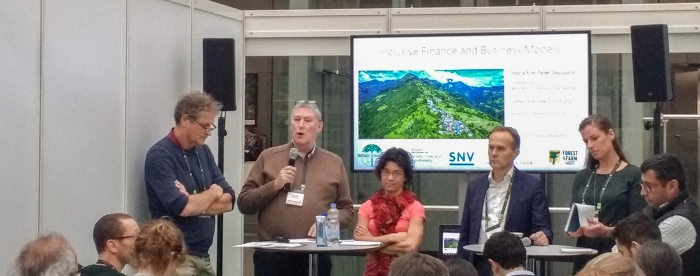News
Our stories ... ...

the Netherlands - 10 January, 2018
Main outcomes of a successful session at the Global Landscapes Forum 2017
“We need to team up to reach scale.” That was the take-home message for René Boot, director of Tropenbos International, who facilitated the interactive panel discussion “Inclusive Finance and Business Models – Actions for Upscaling” – jointly organised by Tropenbos International and the CGIAR Research Programme on Forests, Trees and Agroforestry – at the inclusive landscapes finance pavilion of the Global Landscapes Forum 2017 in Bonn.
All 40 participants of the interactive panel discussion were encouraged to share their insights and experiences. The need and opportunities for investors and companies to go from a “do-no-harm” to a “do-good” approach when investing in sustainable land management businesses were discussed. What viable finance and business models are both good for business and can improve the livelihoods, land security and entrepreneurial potential of smallholders and communities? What is needed to make these work on the ground? There was great interest in this topic. Besides those participating in Bonn, the session was followed by anonline audience of around 50 people.
Watch: Inclusive Finance and Business Models – Actions for Upscaling
The main outcome of the session is that the success of do-good approaches will largely depend on collaboration and connections: international and local financial organisations need to join hands, combining different instruments; farmers need to organise themselves and professionalise; investors need to adjust their requirements to smallholders; companies need to engage neighbouring communities and build trust; and aggregators are needed to connect smallholders tofinancial institutions. Local governments will need to be on board as well, to provide the enabling environment. Finally, scaling up do-good approaches will require private actors to adopt a new mind-set; approaching smallholders as entrepreneurs with potential rather than as potential victims, and factoring in the natural environment as the foundation for long-term viability, rather than as the sole interest of external action groups. Under such conditions, doing good makes business sense.
A report of the session is available for download here
Read more: Good investments in agriculture and forestry can benefit smallholders and landscapes